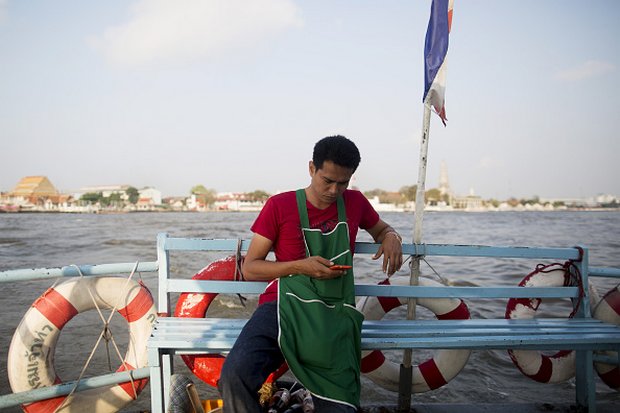
Academics are calling for better channels for fishing trawler crew to complain to state agencies working on curbing forced labour in the fishing industry.
They have proposed WiFi internet access on board fishing boats, which would enable workers to seek help or complain via a mobile application created by the Labour Ministry.
WiFi access would help the workers communicate with relatives or others who could help should they run into labour rights violations, said Supang Chantavanich, director of Asian Research Centre for Migration at Chulalongkorn University.
She was speaking at a seminar on Thailand's labour situation called by the university, the Labour Rights Promotion Network and the International Labour Organisation (ILO).
Currently, work to improve labour problems in the fishing industry tends to focus on improving fishing hardware, while other key aspects of the problem, particularly illegal labour brokering, have yet to get much attention, said Ms Supang.
Labour rights violations normally start with illegal brokers while the many months in which workers are forced to stay at sea on fishing trawlers only compounds the risk of them facing rights violations, she said.
She also proposed the government consider adopting a more transparent system of wage payment for fishing trawler workers, by paying them through the banking system.
As for the time trawlers are allowed to fish, she said the maximum period at sea should be six months.
Evidence of forced labour in the fishing industry includes illegal brokers who supply crew for the trawlers, and a lack of sufficient mechanisms by the state to ensure protection for labourers, she said.
Labour rights should be made the main focus of efforts to solve problems facing the sector, said Lae Dilokwitthayarat, of Chulalongkorn University's Faculty of Economics.
The problems in the fishing sector led to the United States placing Thailand on Tier 3, the lowest status in the US State Department's annual Trafficking in Persons (TIP) report.
The European Union, also concerned about Thailand's efforts to tackle illegal fishing, has confirmed Thailand has more time to halt illegal fishing.
It says the country is making slow progress and in comments on its website on Wednesday added human trafficking and slave labour conditions for fishermen to the list of its concerns.
The EU's remarks are at odds with comments on Monday by Deputy Prime Minister Prawit Wongsuwon that the Europeans had extended their original six-month "yellow card" warning by yet another six months.
Back at the seminar, academics agree workers on trawlers need more protection. "I agree workers need access to channels to lodge a complaint to authorities so they can better protect themselves," said Mr Lae.
Arrak Phrammani, director-general of the Department of Employment, said staff have developed a mobile application to allow migrant workers to lodge complaints in their own languages.
The department had worked with countries supplying labourers on developing the app, adding it had also set up a centre to arrange help for migrant workers.
Pol Lt Col Khomwit Phatthanarat, director of the 1st Prevention and Suppression Section of the Department of Special Investigation's Anti-Human Trafficking Centre, said authorities plan to crack down on at least three illegal labour brokers in Samut Sakhon found to have lured labourers to work on Thai fishing trawlers operating in Indonesian waters.